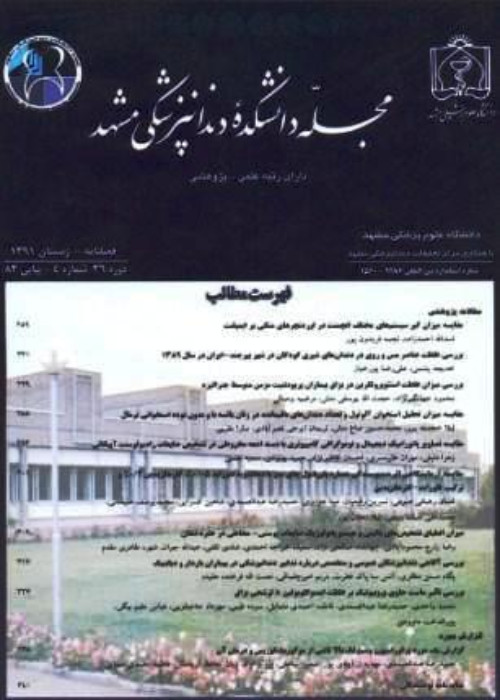Evaluation of Antimicrobial effects of Aqueous and Alcoholic Extracts of Saffron on Oral Pathogenic Microbes (Streptococcus Mutans, Lactobacillus, Candida Albicans)
Author(s):
Abstract:
Introduction
Dental caries is an infectious disease and various microorganisms have a pivotal role in its onset and development. Medications used to reduce microbes are usually accompanied with side effects. Therefore, it seems necessary to search for antimicrobial agents with less side effects. In this study, we aimed to evaluate the antimicrobial effects of aqueous and alcoholic extracts of saffron on oral pathogenic microbes.Materials and Methods
In total, six 9-year-old male students were selected from a primary school. Samples of dental plaque, saliva, and depth of tooth decay were obtained from the participants to evaluate Streptococcus mutans, Lactobacillus, and Candida albicans and were sent to the laboratory afterwards. After assessing the samples via broth dilution method and incubation, six samples of Lactobacillus, eight samples of Candida albicans, and six samples of Streptococcus mutans were evaluated due to difficulty in turbidity detection. Afterwards, overnight cultures were prepared and evaluated for minimal bactericidal concentration (MBC) determination. In the next stage, penicillin and nystatin positive culture tests were used to compare the effects of microbes. In this study, one-way ANOVA was used to compare all the study groups, while pairwise comparison was performed using Tukey test.Results
Our findings were indicative of inhibitory effects of aqueous and alcoholic extracts of saffron on all three microbes. However, they were less effective compared to standard antibiotics (e.g., penicillin). A significant difference was observed between the effect of aqueous and alcoholic extracts of saffron and penicillin on the Streptococcus mutans (PConclusion
According to the results, while saffron had bacteriostatic effects on Streptococcus mutans and Lactobacillus, it had antifungal activities against Candida albicans. Therefore, saffron could be recommended as a mouthwash due to its herbal origin, cost-effectiveness, and fewer side effects. Keywords:
Language:
Persian
Published:
Journal of Mashhad Dental School, Volume:40 Issue: 3, 2016
Pages:
203 to 212
magiran.com/p1582195
دانلود و مطالعه متن این مقاله با یکی از روشهای زیر امکان پذیر است:
اشتراک شخصی
با عضویت و پرداخت آنلاین حق اشتراک یکساله به مبلغ 1,390,000ريال میتوانید 70 عنوان مطلب دانلود کنید!
اشتراک سازمانی
به کتابخانه دانشگاه یا محل کار خود پیشنهاد کنید تا اشتراک سازمانی این پایگاه را برای دسترسی نامحدود همه کاربران به متن مطالب تهیه نمایند!
توجه!
- حق عضویت دریافتی صرف حمایت از نشریات عضو و نگهداری، تکمیل و توسعه مگیران میشود.
- پرداخت حق اشتراک و دانلود مقالات اجازه بازنشر آن در سایر رسانههای چاپی و دیجیتال را به کاربر نمیدهد.
In order to view content subscription is required
Personal subscription
Subscribe magiran.com for 70 € euros via PayPal and download 70 articles during a year.
Organization subscription
Please contact us to subscribe your university or library for unlimited access!



